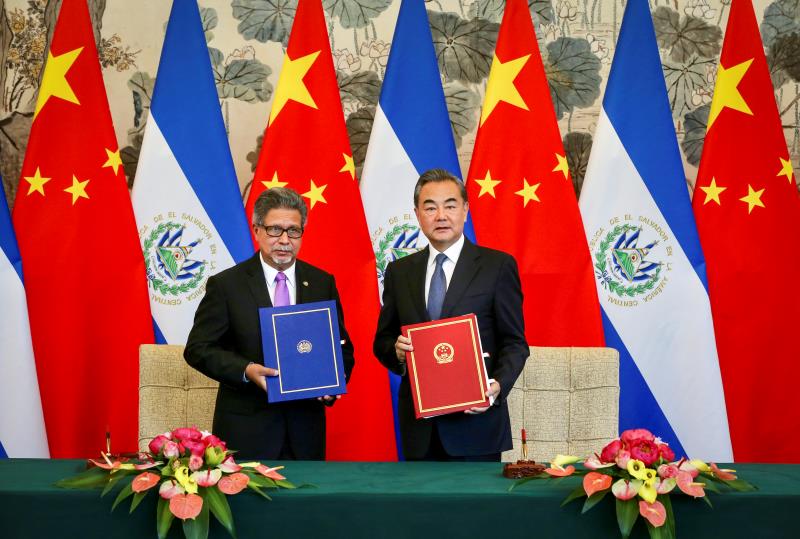People's Republic of China, Republic of El Salvador establish diplomatic ties
The People's Republic of China and the Republic of El Salvador signed a joint communique in Beijing Tuesday establishing diplomatic relations.
The People's Republic of China and the Republic of El Salvador signed a joint communique in Beijing on Tuesday establishing diplomatic relations.

The communique was signed by Chinese State Councilor and Foreign Minister Wang Yi and Salvadorean Foreign Minister Carlos Castaneda.
"The People's Republic of China and the Republic of El Salvador, in keeping with the interests and desire of the two peoples, have decided to recognize each other and establish diplomatic relations at the ambassadorial level effective from the date of signature of this communique.
"The two governments agree to develop friendly relations between the two countries on the basis of the principles of mutual respect for sovereignty and territorial integrity, mutual non-aggression, non-interference in each other's internal affairs, equality, mutual benefit and peaceful coexistence.
"The Government of the Republic of El Salvador recognizes that there is but one China in the world, that the Government of the People's Republic of China is the sole legal government representing the whole of China, and that Taiwan is an inalienable part of China's territory," the communique said.
According to the communique, the Government of the Republic of El Salvador severs "diplomatic relations" with Taiwan as of this day and undertakes not to have any more official relations or official exchanges with Taiwan. The Government of the People's Republic of China appreciates this position of the Government of the Republic of El Salvador.
The Government of the People's Republic of China and the Government of the Republic of El Salvador agree that in accordance with the provisions of the Vienna Convention on Diplomatic Relations of 1961 and common international practice, they will exchange ambassadors, and provide each other with all the necessary assistance for the establishment and performance of the functions of their respective embassies in each other's capitals on the basis of reciprocity, the communique said.
"Adhering to the one-China principle is a universally recognized international norm and the consensus of the international community, as well as the fundamental foundation for China to establish and develop relations with any country.
"El Salvador has now stood with the overwhelming majority of the countries in the world by resolutely deciding to recognize and make a commitment to abiding by the one-China principle, and to establish diplomatic ties with China without any preconditions," Wang said.
So far, 178 countries have established diplomatic ties with China, according to Wang.
"I believe the Salvadorean people will feel the Chinese people's friendship and hospitality and benefit from the two countries' cooperation," Wang said, stressing that history will prove that forging diplomatic relations with China is in the fundamental and long-term interests of the Salvadorean people.
Wang said China has now added a friend in Latin America and the Caribbean region, as well as a partner in pushing forward the Belt and Road initiative and building a community of a shared future for humanity.
China is willing to join hands with El Salvador to achieve their joint development, press ahead with China-Latin America cooperation as a whole, and contribute to the collective rejuvenation of the developing countries.
Castaneda said that forging diplomatic ties with the People's Republic of China is a strategic decision made by El Salvador and a historic event for the country.
El Salvador has cut its so-called "diplomatic ties" with Taiwan, and it will no longer have any official relations or any official exchanges with Taiwan in any form, he pledged.
Saying that El Salvador is willing to work with China to enhance political trust, strengthen exchanges at various levels and carry out pragmatic cooperation, Castaneda expressed his hope that the two countries' cooperation will usher in a new era and benefit the two peoples.

